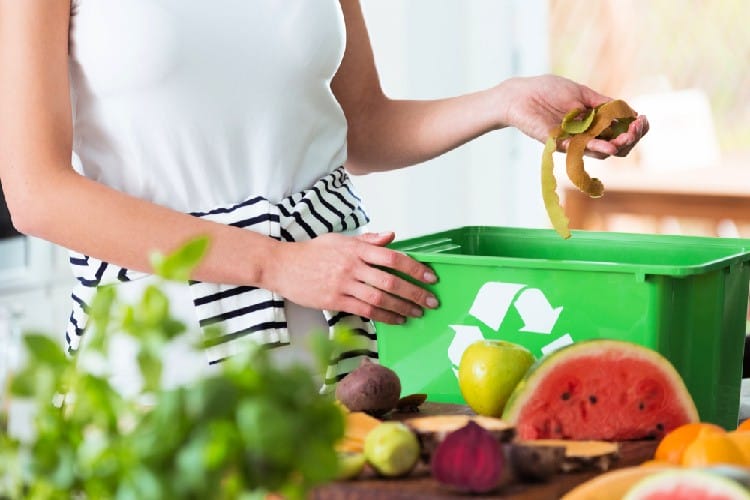
The kitchen is the center of our home. It is the heartbeat. Which makes it the perfect place to start your sustainable life.
Small, but significant changes can be made to ensure that the heart of your home is environmentally conscious. It won’t take as much time or effort to make these changes as you might think. Plus, they may even save you money in the long run!
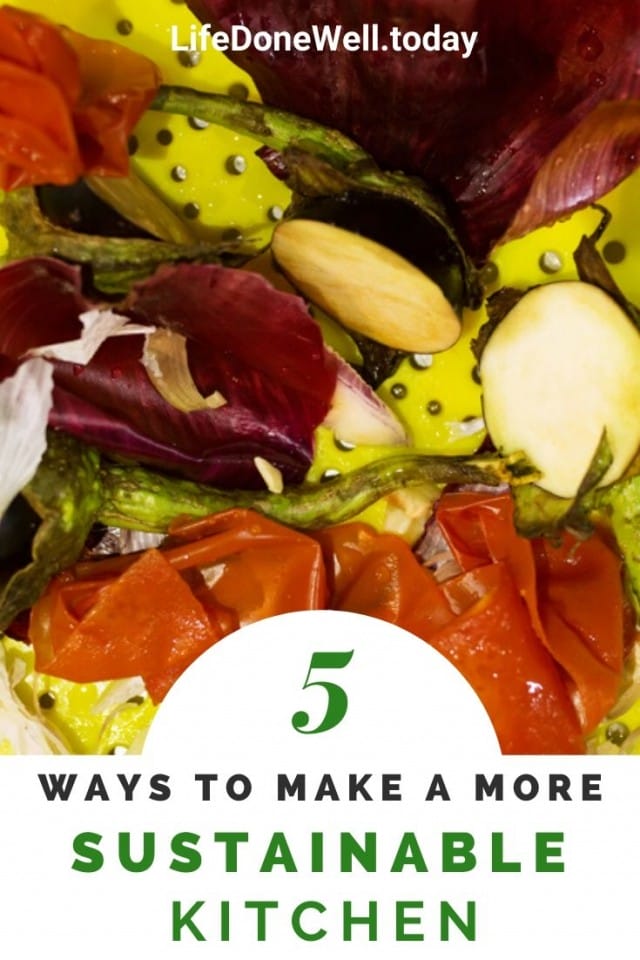
Of course, to make a more sustainable kitchen you should be turning off lights when not in use, using LED lightbulbs, investing in Energy Star appliances, using filtered water and not bottles, using ec0-friendly cleaning products, and not leaving water run. And please try and use sustainable materials and recycle if you do a kitchen remodel. But here are some additional ideas you might not have put into place yet…
Disclosure: This article is not sponsored, but does include both refer-a-friend codes and affiliate links.
5 Ways to Make A More Sustainable Kitchen
Ditch the Plastic
Did you know that your kitchen doesn’t have to be overflowing with plastic lids, tubs, containers and everything else that just jumbles up your cupboards? You can use Beeswax wraps and Ball Canning or Mason Jars for leftover containers and ditch the plastic.
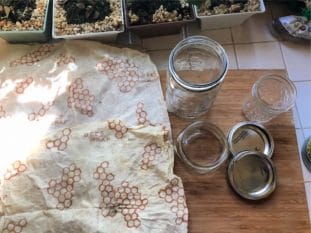
Beeswax wraps come in a variety of sizes and shapes, including bread loaf sizes for baguettes. We love Mason and Ball Jars for one very important reason…there are tons of sizes and shapes, but only two lids for them all! No looking for that perfect lid you can never find, whether regular or wide mouth!
When you use these options, you will be making an environmentally conscious choice while also making your kitchen look fabulous. Win-win!
Buy to Last
Purchase high quality appliances, cookware, and utensils that will last you for years to come. Opt for stainless steel or cast iron cookware. I use my cast iron skillet all the time. They are great for cornbread, frittatas and meats. A good cast iron skillet should last you for generations. Also, choose sturdy utensils that won’t rot or melt. Buy high-quality knives that you can sharpen by hand.
Please don’t buy the latest and greatest gadget that you will never use. When we remodeled our kitchen several years ago, I purged everything and put items I hadn’t used in at least a year in a big bin. The idea was to recycle or donate if I still hadn’t used in another year. Well, guess what, two years later that bin has never been opened!
Change Your Food Habits
There are so many ways to you can limit the amount of food you waste every month just by changing a few food habits.
- First, and most important…shop smart. Be realistic with the amount of food you buy, especially if it is fresh and has a limited shelf life.
- Buy and cook fresh food and avoid using prepackaged food.
- Don’t over serve yourself or your guests/family. Try to make the first serving smaller, with the notion that second helpings are always encouraged.
- Use your leftovers (see #5)! Last night’s dinner is great for lunch tomorrow. Save your extra cooked veggies for a frittata on the weekend or make a chef salad out of them. Left over chicken can be used in so many different ways, like chicken salad, chicken noodle soup, and pot pies.
- Check out using MisfitsMarket.com. By clicking on the link and using the code COOKWME-CD1GUU, you get 25% off your first order. They ship fresh, organic, but slightly irregular produce that wouldn’t be accepted by retailers directly to your door. This service can save you up to 40%!
Switch to Cloth Napkins and Dish Towels
Think about how often you grab a paper towel or see your kids use 3 napkins to wipe up the smallest spill. Cloth napkins and towels eliminate all that daily waste. We leave a canvas bag attached to the kitchen door and just put the dirty towels in there and wash once a week.
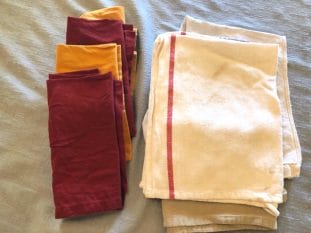
As for napkins, we can get 2-3 days out of one. We leave the napkins folded up at each person’s seat and use it for a few meals. Another bonus is the money you will save in the long run by skipping the paper products aisle on your grocery store trips!
Composting
It’s not as hard or yucky as it seems! If you want a totally hands-off approach or you do not have space for a bin, see if your area has a composting program that will do it for you. Many cities now offer a compost can to sit along side your garbage and recycling. Even in NYC you can pick up a compost container from local farmers’ markets and drop it off when you pick up your produce. They do the composting for you.
Simply buying a compost container and throwing your scraps inside will go a long way to helping the environment. But having a special container is not necessary. I have a few compost piles for the garden. I use a simple container with a tight lid that I fill up and dump out.

Just please be careful to follow compost rules such as no meats, no onion peels, and no citrus. I am starting a long term compost with peels, they just take much longer. And there’s a bonus…Having a small compost bin in your yard will not only allow you to have your own place to put everything, but also give you the greenest lawn in the neighborhood!
Cook Once Eat Twice (or 3 times)
Leftovers are not a dirty word. They do not have to be second rate. Eat them! Look into ways to reuse leftovers in a different dish if you get too bored. Cooked vegetables can go into a soup. Rice can be used for a stir fry. Little leftovers in a glass jar make a perfect snack.
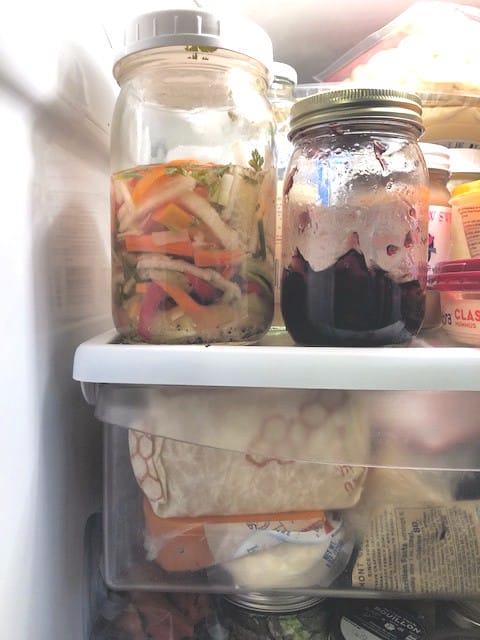
Yesterday, I had leftover roasted carrots on my yogurt and they were so yummy! Chicken can be cooked hundreds of ways that everyone will enjoy. Want some more ideas? I’ve got several awesome recipes here.
The main point of this article is that you (and that includes anyone) can help make a more sustainable kitchen. With a little foresight and some effort, you can make a big difference while making your family dinner!
How have you made your life more sustainable?

I am a home cook that does things my way. In my kitchen, I make breakfast, pack lunches, prepare snacks, and cook dinner. During the week, we eat real food that is homemade, organic, and local. On the weekends we do explore more of our local restaurants. I bake my own bread, juice fresh oranges every other day, and make my own kombucha and other weekly favorites.












